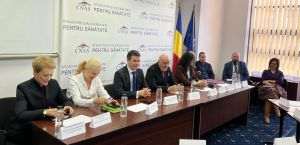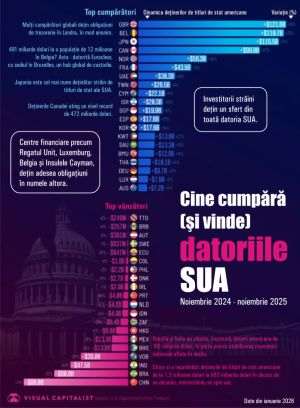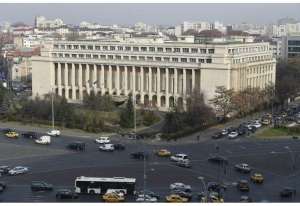Political negotiations to shape a governing coalition were the constant of the first 22 days of June, a period in which the leaders of the PSD, PNL, USR, UDMR and those of the National Minorities Group discussed intensively at the Cotroceni Palace, the Palace of Parliament and even the Victoria Palace both on the future structure of the Executive, as well as on the coordinates of the governing program and the measures to be taken to reduce the budget deficit. After intense negotiations between the parliamentary parties, in June the agreement was signed for the establishment of a governing coalition formed by the PSD, PNL, USR, UDMR and the National Minorities Group. The joint proposal for the position of prime minister was Ilie Bolojan. The new government passed the Parliament's test on June 23, after a formal mock hearing in the specialized committees, and that same evening it was sworn in at Cotroceni Palace. The first meeting of the Bolojan Government took place on the very night of the inauguration, at Victoria Palace.
During this time, the country was led by an interim government led by Prime Minister Cătălin Predoiu, who adopted only minimal administrative measures, without strategic initiatives, but who continued to allocate amounts for various investments and approve the budgets of some state-owned companies, a fact that will be reflected in public spending for the current year.
Read June in numbers
The respective decisions came after the budget execution for May showed a budget deficit of 3.39% of the Gross Domestic Product, but also a stagnation at the economic level noted by the National Institute of Statistics, stagnation that comes in a context of prudent household consumption and reduced investments, generated by investor caution and political uncertainties since the beginning of the summer. The business environment reported a disrupted level of activity, with important regional discrepancies: urban centers such as Bucharest and Cluj still maintain more dynamic economic flows compared to less developed areas, but the general pace is included in the national average.
During the past month, a topic debated by both the authorities and the business environment and civil society, in light of the increase in bills, was the expiration, from July 1, of the electricity capping scheme, a topic to which were added, between June 23 and June 30, the fiscal adjustments that the Bologna government was forced to assume during July, including the increase in the general VAT rate from 19% to 21%, the increase in reduced VAT rates, with minor exceptions - basic food products, medicines, and others - from 5% and 9% to 11% and the increase in excise duties, measures that may lead to additional inflationary pressures in the short term.
One sector of activity that was affected by political decisions regarding ensuring stable financing for government programs is the automotive sector, which faced the temporary suspension of the Rabla Program, which led to a 50% decrease in new car sales, which means a steep contraction, which affected the supply chains and revenues of the partner companies in our country of the automakers.
Regarding European financing, by the end of June 2025, our country had attracted only 10.72 billion euros from the PNRR, of which 4.32 billion euros in the form of loans and 6.4 billion euros in grants, a pace considered slow compared to Eastern European countries.
In light of the above, in order to ensure the necessary revenues for the state budget, the Government resorted to new Tezaur and Fidelis issues during June. By selling Fidelis government bonds, the Ministry of Finance attracted 1.64 billion lei, compared to 1.18 billion lei in May, showing a solid appetite of the population for state savings instruments. In fact, according to a press release from the Ministry of Finance, in the five Fidelis editions that took place in the first semester, the Government borrowed 10.8 billion lei from the population through this program alone, to which is added the income obtained from the issuances of the Tezaur program. The result indicates confidence in state-guaranteed instruments, but raises questions about the long-term sustainability of financing through domestic debt, if the deficit continues to expand. Economists warned last month that, in the context of the increased budget deficit and fiscal uncertainties, the risk of recession could be amplified. At the same time, demand is directly influenced by the rates offered: attractive offers compared to bank deposits have caused a shift of individual savings from banks to public securities, but this phenomenon cannot be compensate for structural fiscal imbalances alone.
• Negotiations with expected end: Ilie Bolojan, head of the new government
Started on May 26, 2025 at the request of President Nicuşor Dan, the negotiations for the conclusion of the new governing coalition lasted almost a month, a period in which each pro-European parliamentary party wanted to impose certain measures in the future government program and, for this reason, we witnessed bizarre initial proposals such as taxing all banking transactions and increasing the tax on gains from stock market transactions. Some of the proposals were later abandoned, as was the case with taxing all banking transactions, and others remained in suspense, such as the one regarding stock market transactions.
After long negotiations and after convening parliamentary parties for consultations at Cotroceni Palace, on June 20, 2025, President Nicuşor Dan appointed Ilie Bolojan as Prime Minister, and on June 23, Parliament granted the investiture to the new government, after previously on the same day the leaders of PSD, PNL, USR, UDMR and the National Minorities Group signed the agreement for the formation of the governing coalition. After signing the agreement, the hearing of the ministers began in committees and took place quickly, in only 4 and a half hours on the same day, and the new cabinet was put to a vote in plenary. The government was invested with 301 votes in favor, above the required threshold of 233 votes, despite the absence and protests from the opposition exercised by the so-called sovereignist parties.
In his speech in Parliament, Prime Minister Ilie Bolojan stressed that Romania faces a real risk of default if the fiscal approach does not change quickly and that the new government framework will be marked by drastic changes that will affect both citizens and the budgetary apparatus, measures that will prioritize the reform of the public system and budgetary expenditures, the increase of some taxes and fees combined with the consolidation of financial discipline and the fight against tax evasion. .
In the evening of the same day, the ministers took the oath at Cotroceni Palace, and then the first meeting took place at Victoria Palace, marked by the appointment of the five deputy prime ministers and the 16 ministries, according to the political configuration and the distribution between parties.
The new Government has the following composition: Ilie-Gavril Bolojan - Prime Minister; Marian Neacşu - Deputy Prime Minister; Tanczos Barna - Deputy Prime Minister; Michael-Dragoş Anastasiu - Deputy Prime Minister; Marian-Cătălin Predoiu - Deputy Prime Minister, Minister of Internal Affairs; Liviu-Ionuţ Moşteanu - Deputy Prime Minister, Minister of National Defense; Ciprian-Constantin Şerban - Minister of Transport and Infrastructure; Alexandru Nazare - Minister of Finance; Radu Marinescu - Minister of Justice; Florin-Ionuţ Barbu - Minister of Agriculture and Rural Development; Bogdan-Gruia Ivan - Minister of Energy; Alexandru-Florin Rogobete - Minister of Health; Dragoş-Nicolae Pîslaru - Minister of Investments and European Projects; Daniel-Ovidiu David - Minister of Education and Research; Oana-Silvia Ţoiu - Minister of Foreign Affairs; Diana-Anda Buzoianu - Minister of Environment, Waters and Forests; Petre-Florin Manole - Minister of Labor, Family, Youth and Social Solidarity; Radu-Dinel Miruţă - Minister of Economy, Digitalization, Entrepreneurship and Tourism; Cseke Attila-Zoltan - Minister of Development, Public Works and Administration; Demeter Andras Istvan - Minister of Culture.
• Financial support for Praid, new allocations for investments
In the first three weeks of last month, the interim government led by Cătălin Predoiu - who has been in office for 47 days - approved a significant series of budget expenditures aimed at supporting the economy, responding to local emergencies and contributing to the development of infrastructure and social protection. From the beginning of the month until June 23, funds were allocated to support enterprises affected by the May floods in the locality of Praid, totaling 300 million lei, of which 200 million lei for the extractive and processing industry, and 100 million lei for tourism and food. We recall that the Praid Salt Mine was closed after, following heavy flooding, the water of the Corund stream infiltrated the galleries. Specialists sent to the scene, including those sent through the European Civil Protection Mechanism, estimated that between 4 million and 7 million cubic meters of salt water had entered the underground, endangering both the salt mining and tourism in the Praid Salt Mine. The authorities immediately started works to divert the bed of the Corund stream, and upon completion, the procedure for removing water from the mine will begin, but after first creating an artificial pond.
Also last month, the interim government approved state aid of 279.1 million lei for the Oltenia Energy Complex for the payment of CO2's certificates , and for the expropriations necessary for the construction of transport infrastructure, including the Botoşani Ring Road and the Sibiu-Piteşti Motorway, over 9.5 million lei were allocated. In parallel, allocations were approved for additional expropriations regarding the Mediaş bypass, the Bucharest Ring Road, DN7 Bâldana-Titu and the bridge over the Danube in Brăila, totaling over 30 million lei.
Other amounts were directed to supporting cultural investments, for updating the value of public goods, as well as for transport facilities for students, including the reintroduction of online ticket purchase.
The National Administration "Apele Române” benefited in June from a budget increase to 4.25 billion lei, for the purpose of flood prevention, infrastructure modernization and climate resilience. In addition, measures to streamline public spending in the environmental field were approved, through a memorandum that establishes clear criteria and deadlines for optimizing investments and strategic planning.
Starting with June 23 and up to June 30 inclusive, the new executive led by Prime Minister Ilie Bolojan quickly implemented a series of measures that include both structural reforms and direct social and economic interventions. Emergency ordinances were adopted to refund amounts paid to the Energy Transition Fund, allocate monthly vouchers worth 50 lei for vulnerable electricity consumers - with an estimated budgetary impact of 1 billion lei - and extend the capping of the commercial mark-up on basic food until 30 September 2025. At the same time, several budgetary austerity measures were debated in first reading, at the end of June and subsequently adopted at the beginning of July, such as limiting public sector bonuses to 300 lei gross per month and reducing additional leave to a maximum of 5 days, for activities in dangerous conditions, in order to correct the budget deficit.
The government also decided to maintain the current organization of the General Directorate for Anti-Fiscal Fraud, in order to avoid additional costs. Relevant decisions include reducing the allowances of members of the Interministerial Committee for Financing, Guarantees and Insurance and amendments to the legislation on Eximbank. During the same period, measures were also approved regarding the extension of the deadlines for the implementation of the national RO e-Invoice system in the case of certain institutions, as well as the repeal of some articles regarding the reorganization of ANAF. These decisions reflect a clear direction towards reducing administrative costs and streamlining the institutional structure.
• NATO Decision: Defense Allocation Increased to 5% of GDP by 2035
All the budget consolidation measures debated by the new governing coalition in June, measures that began to be adopted and implemented in July, had to be reconsidered at the end of last month with the decision of the NATO summit in The Hague, which established that allied states must increase their defense and security allocation to 5% of Gross Domestic Product, in stages, by 2035.
The measure taken at the NATO summit on June 25 was previously approved at the B9 Format summit that took place in Vilnius, Lithuania, and which next year would be held in Romania, based on the proposal made by President Nicuşor Dan. The 5% allocation is composed of 3.5% for direct military spending and another 1.5% for related infrastructure, vital in the logistical support of allied forces, such as the Port of Constanta or the strategic railway networks, as stated by President Nicuşor Dan.
The two summits were an opportunity to reiterate the commitment to developing modern facilities for allied forces on NATO's Eastern Flank and to support the European initiative to create a strategic hub on the Black Sea, an essential instrument for regional stabilization, with economic, environmental and, above all, energy security implications. Regarding this hub, after the European Council meeting of 26 June, President Nicuşor Dan stated that the location of the respective European regional security and defense center should be in Constanta, because it is the most important port of the European Union on the Black Sea.
A landmark moment in June was the decision of the Dutch government to donate 18 F-16 aircraft to Romania, which will be in the possession of the Romanian state by the end of the year, a decision that was announced before the NATO summit in The Hague. The transfer is made symbolically for the sum of one euro, reflecting a deep solidarity between the allies and the trust in Romania as a regional training center for NATO pilots. The aircraft will be operated within the F-16 Training Center in Feteşti, becoming an essential platform for the training and interoperability of pilots from across the allied space. This strategic move not only strengthens Romania's air capabilities, but also confirms its position as a security provider in the region.
• Fighting tax evasion on the CSAT agenda
After the NATO summit, on June 30, the meeting of the Supreme National Defense Council was held, convened by President Nicuşor Dan, where the fight against tax evasion was also on the agenda, which has reached alarming levels according to political decision-makers. CSAT members agreed that tax evasion has become an economic scourge that directly undermines the state's ability to invest in defense, health, education and infrastructure. Therefore, they supported the adoption of a tougher regulatory framework, including through clear criminal sanctions, and called for concrete and coordinated actions to identify and dismantle tax fraud networks. According to the decisions taken in the CSAT, the digitalization of the tax system and the intensification of controls become mandatory directions, not just optional.
During the meeting, the annual report of the National Cyber Security Directorate was analyzed and approved, a document that signals a significant increase in risks in the digital space. The report reveals a high level of threats, including incidents and critical vulnerabilities, requiring increased resilience and preparedness measures for national institutions. In an unstable international climate, the members of the CSAT showed that protecting computer networks is becoming as crucial as defending physical borders.
Special attention was also paid to the Praid Salt Mine, a strategic objective with major economic and social implications. The CSAT analyzed scenarios regarding the mine's reconditioning following the massive floods in the second half of the Great Month, as well as the development of a new facility, given that the safety of employees and the local community must be protected against new vulnerabilities.


















































